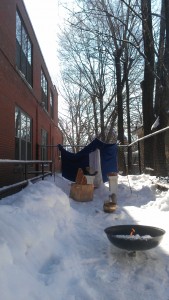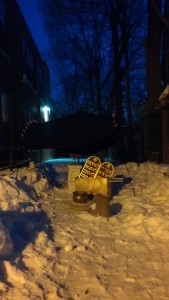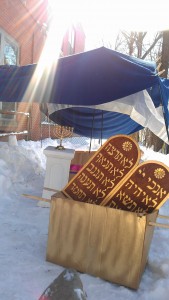When Simon and I lived in Massachusetts, we would participate in doing some colonial re-enacting. He would be a farmer from Chelmsford; I would be a farm wife. I’m pretty good at entertaining little ones with a cup and ball game and cooking over an open fire, even in long dresses and petticoats. He was great at sewing, building a fire and lining up with his musket. But we were playacting. The truth is, if I had lived in Chelmsford in 1775, I could not have been a land owner. You needed to be white, male and a Christian to own land.Things changed by the time we moved to Chelmsford.
This week we started reading the book of Leviticus. For many moderns, it can be a difficult book. The idea of the cohanim, the priests, sacrificing animals on my behalf does not express my spirituality very well. And while I admit that I love a good steak, I am not interested in having a barbecue in the synagogue parking lot as how I collect my pay. So what is Leviticus about? Rabbi Nehemia Polan talks about it being a reset button. The Israelites want to recapture the experience they had at Sinai. They want to “draw close” to God. That is the root of Korban, one of the sacrifices being offered. It is also the root word that appears most frequently in this first parsha of Leviticus.
Religion in Latin comes from the word religio, to tie back up. That is the purpose, to re-create, to re-enact the experience of connecting with the Divine. To feel that Divine presence, that Divine Love. The Israelites, commanded by God do exactly that by re-creating all of the elements. Smoke, Fire, a Pleasing Odor, A Boundary that could not be crossed, intermediaries (the priests), washing of clothes, purifying bodies, staying ritually ready. Everything that happens in Chapter 19 of Exodus happens again here in Leviticus.
I am still not ready to sacrifice an animal in the synagogue parking lot or return to sacrifices on the Temple Mount if and when a Third Temple is erected. That’s not how I think I am going to draw close to God.
In 70 CE, the Second Temple was destroyed, centralized worship and animal sacrifice game to an abrupt end. Judaism had to re-invent itself again or go the way of other civilizations. And so it did. It became a religion of study and prayers. “A story is told about Rabban Johanan ben Zakkai that he was walking along the road when Rabbi Joshua ran after him and said to him: Woe to us because the house of our life has been destroyed, the place which used to atone for our sins. He answered: Do not despair we have another atonement instead of it. He asked; what is it? Johanan answered: ‘For I desire loving kindness and not sacrifices’. (Hos. 6:6) (ARN 8:38.)” The evening prayer, ma’ariv and the morning prayer, shacharit and replaced the “one in the evening, one in the morning sacrifices of the priests. Our homes became known as a mikdash ma’at, a little sanctuary.
This was a huge and radical shift. As one of my students said this week after reading this story, she wasn’t sure that would have been her response looking at the burning smoldering mound that had been the Temple. She might have been seriously depressed and lack any words what so-ever. “Oh woe is me.” or “Oy vey” might have been the extent of it. And for many that would probably be about it.
Some have argued that we in American Judaism are at precisely this kind of shift. The Pew Study (which until now I haven’t written about but have been thinking about) has made communal Jewish leaders once again depressed. “Oh woe is me” “Oy vey” the intermarriage rate is up. A category of Jews who are millenials and see themselves as Jewish but not as a religion. That trend exists in the Christian world too. There is even a name for them, “Nones”. Truth be told, depending on how you read Pew you can draw those conclusions. http://www.pewforum.org/2013/10/01/jewish-american-beliefs-attitudes-culture-survey/
I used to craft surveys for a living. The Pew Study is not especially well crafted. People answered the questions asked, and no more. Which is exactly what people do. Jewish leaders have been bemoaning trends in the Jewish community for decades. But what if the question is wrong. What if instead of asking “Who is a Jew?” or “What kind of Jew are you?” or “How do you practice being Jewish?”, we ask, “Why are you Jewish? What do you like about being Jewish? What do you want to pass down to your children or children’s children?” What if instead of yelling at someone who is considering marrying someone not Jewish we say, “Mazel tov!” and “How can we help you explain Judaism to your significant other?” or “How do you want to celebrate life’s milestones.”
I work in a congregation that is at least 50% intermarried. That is not news. Most of the synagogue leadership, including the president, the president of Sisterhood and the president of the Men’s Club, the secretary, the treasurer, the VP of Education, the chair of the ritual committee are married to someone who wasn’t born Jewish. Some chose to convert. Others did not. All of them raised their children as Jews. It would seem disingenuous to me to sit down with one of those children, now adults contemplating marriages of their own and say they can’t marry someone who isn’t Jewish. Their parents already have and the world did not come to an end. In fact, they are now sitting before me as JEWS and mensches. Their parents must have done something right!
There are lots of books out right now telling us how to get through this new seismic shift. Relational Judaism by Dr. Ron Wolfson talks about the need to deepen our connections to people, to build community. Playlist Judaism by Rabbi Kerry Olitzky talks about the idea that people today only want to pick the part of the album they want to hear. IPods have fundamentally changed how we purchase music. That needs to be true of synagogue membership. Want Hebrew School, great, that is fee x. Want pre-school? That is y. Want High Holidays? That’s z. Want the full subscription, soup to nuts, that is a. In the process, we may deepen people’s commitment and relationship. Jewish Megatrends, Finding a Spiritual Home, even a book on the difficulties and changes of modern parenting, All Joy, No Fun have pieces of the answer. But the truth is, we are on the cusp of something new. This has never been done before. And so NO ONE has all the answers. It is beyond ALL OF US.
This week there was a fascinating d’var Torah published by Punk Torah. http://punktorah.org/is-judaism-programming-itself-to-death-parshah-vayikra-by-rabbi-patrick/ He makes the case, much like All Joy No Fun, that we are over programming. Judaism is going to die by over programming. One in the morning, one in the evening may just be too much. I think he is right. He also thinks, like Relational Judaism, that it is about the community, about the people. He is right. He identifies three questions:
- “How are we doing as a community to serve other people?”
- “How can we help people’s hearts be overwhelmed spiritually?”
- “How can we help create the kind of world that others want to live in?”
Those are great questions. I think he missed the fourth. “How do we relate to God?” Back to Leviticus, that is what they were trying to do–relate to God, find God’s presence. We can build community in lots of places–at our children’s schools, with the parents in PTO, on the soccer field, performing in a musical, at Girl Scout camp, at our places of employment, at the health club or Kiwanis, Rotary, WeightWatchers. What sets a synagogue community apart is creating a safe, non-judgmental space to discuss the big issues of the day, from within a Jewish context. Why are we Jewish?
If we keep the focus there and not on saying, “We can’t do that. It has never been done that way before.” Then I am very optimistic about Judaism. Will it sound like Sinai? No. Will it look like Leviticus? No. Will it be like the Talmud? No. Will it smell like the shtel? No. Will it taste like your bubbe’s kitchen? I doubt it.
So my answer, is stop bemoaning our fate. Celebrate every Jew and every potential Jew that walks through the door. Find a place for everyone at the table. Welcome everyone who wants to be a part of Judaism, who wants to be a part of our community–because they were born Jewish, because they are raising Jewish children, because they are curious and want to explore, because they are searching, whatever it is.
Together, we will continue to build a community to discuss the meaning of life, why be Jewish, and how be Jewish. To explore something so essential, so existential. To talk about God.




